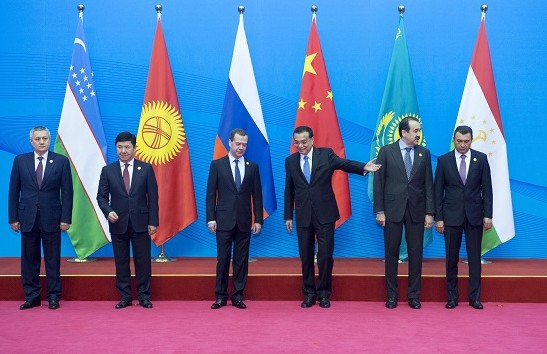
Prime Ministers of the Russia-China-led Shanghai Cooperation Organization (SCO) member states have held talks in Zhengzhou, capital of central China’s Henan Province.
Chinese Premier Li Keqiang and his Russian counterpart Dmitry Medvedev along with heads of government of the rest of the SCO took stock of the working group on trade facilitation to ensure that the free movement of goods, services and technologies within these borders will be implemented by 2020.
Welcoming foreign leaders to the meeting, Li said that since it was established in 2001, the SCO had become an important force promoting regional stability, prosperity and development.
“We’ve agreed that we will instruct trade and economy ministers to work out specific measures to set up a free trade area within the SCO framework to create more favourable conditions for trade,” Li said Tuesday, speaking at an expanded meeting of the SCO Council of Heads of Government.
The annual SCO summit, which sets goals and development strategies for the bloc, is attended by heads of state.
The two-day prime minister’s meeting, also an annual event, is attended by heads of government and focuses on implementation of the trade, exchange and security cooperation goals made at the summit.
Alexander Yakovenko, Russian envoy to the UK, has said “the SCO Business Council, Interbank Consortium, and Energy Club are at the forefront of expanding practical cooperation among member states”.
Representatives from the SCO’s six member states – China, Russia, Kazakhstan, Kyrgyzstan, Tajikistan and Uzbekistan are holding the two-day meet this week in China to discuss trade and security issues that affect the region.
Government leaders from Afghanistan, Belarus, India, Iran, Mongolia and Pakistan are also attending as observers.
The bloc leaders are expected to sign a host of cooperation deals and SCO internal affairs resolutions, according to Chinese Vice Foreign Minister Cheng Guoping. Among the most anticipated is a plan to make customs clearances between member countries much easier between 2016 to 2021, in order to promote trade within the bloc.
At the SCO summit attended by Russian and Chinese Presidents Vladimir Putin and Xi Jinping in July, member states began laying out plans to form a SCO development fund and bank to fund infrastructure and energy projects.
Russian Premier Medvedev on Tuesday also pushed for speeding up talks on the SCO transport corridor announced during the leaders summit in July in Ufa.
“Transport infrastructure is a key condition for the development of large business projects,” Medvedev said.
Medvedev also proposed widening the cooperation ambit of the bloc to the Asian economic grouping, the ASEAN.
“Russia proposes starting consultations with the Eurasian Economic Union and Shanghai Cooperation Organization, including the counties joining the alliance, and with countries of the Association of Southeast Asian Nations on the creation of an economic partnership based on the principles of equality and mutual interests,” the Russian Prime Minister said on Tuesday.
The SCO meeting in Zhengzhou this week will also “focus heavily on combating terrorism this year as member states take another vital step in safeguarding regional stability” according to officials quoted by state news agency Xinhua.
With the rise of the Islamic State and the dangers of Central Asia potentially becoming a recruitment hub for the terror group, the leaders are expected to discuss better coordination strategy, information exchanges in the fight against terrorism.
China, Russia and the four Central Asian nations had originally formed the SCO in 2001 as a regional security bloc to fight terror threats and drug trafficking from neighbouring Afghanistan.
Cooperation between China and Russia on Afghanistan has been growing since 2013 and could become a major factor for Afghan leadership following a NATO withdrawal.
As the US and EU step up pressure on Moscow with threats of extended rounds of sanctions, Russia is seeking to strengthen ties with allies in the region, predominantly the BRICS and SCO members.